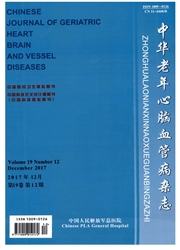

 中文摘要:
中文摘要:
目的探讨首次发作晚发抑郁(LOD)患者基线记忆功能与6个月神经认知结局的关系。方法 选择LOD患者49例,随访6个月,根据认知评分标准,将33例患者分为认知正常组19例和认知障碍组14例。被试基线和随访6个月时,均接受简易智能状态检查量表、认知筛检测验及神经心理成套测验评估。采用3.0T MRI仪行头颅扫描,液体衰减反转恢复序列采集图像,测量脑白质高密度信号体积;采用聚合酶链反应技术进行载脂蛋白E基因分型。结果与认知正常组比较,认知障碍组患者基线简易智能状态检查量表及认知筛检测验总分、言语记忆和视觉记忆各测验评分、言语流畅性(1min)、视空间功能评分及定向力均明显降低,差异有统计学意义(P〈0.05)。logistic回归分析显示,LOD患者基线物品即刻回忆评分与神经认知结局呈负相关。结论 IOD患者基线即刻回忆能力可预测其认知转归,基线时即刻记忆越差,神经认知恶化的风险越大。
 英文摘要:
英文摘要:
Objective To explore the potential predictors of neurocognitive outcome in elderly with first-episode late-onset depression(LOD). Methods Forty nine LOD patients were recruited and followed-up for 6 months. Thirty three with remission were classified into cognitively stable (n = 19) and cognitive impairment groups (n = 14). The subjects received MMSE, cognitive abilities screening instrument(CASI) and comprehensive neuropsychological battery test at baseline and 6 months. They were examined with a 3.0-T MRI system. FLAIR images were acquired for the volumetric measurement of white matter hyperintensity. PCR-RFLP technique was used for apoE genotyping. Results The baseline scores of MMSE and CASI in cognitive impairment group were significantly lower than cognitively stable group (P〈0. 05). Compared with cognitively stable group, the performance of tests of verbal memory, visual memory, verbal fluency and visuospatial function were significantly poorer in cognitive impairment group (P〈0.05). Multivariate logistic regression analysis showed that the score of immediate object memory test was negatively correla ted with cognitive decline in LOD patients (OR = 0.31,95%CI: O. 13--0.70). Conclusion Baseline immediate memory can predict the neurocognitive outcome of I.OD patients. Depressive elderly with worse immediate memory performance may be at greater risk of cognitive decline.
 同期刊论文项目
同期刊论文项目
 同项目期刊论文
同项目期刊论文
 Microstructural White Matter Abnormalities Independent of White Matter Lesion Burden in Amnestic Mil
Microstructural White Matter Abnormalities Independent of White Matter Lesion Burden in Amnestic Mil Regional quantification of white matter hyperintensity in normal aging, mild cognitive impairment, a
Regional quantification of white matter hyperintensity in normal aging, mild cognitive impairment, a Regional pattern of increased water diffusivity in hippocampus and corpus callosum in mild cognitive
Regional pattern of increased water diffusivity in hippocampus and corpus callosum in mild cognitive Alterations in Regional Brain Volume and Individual MRI-Guided Perfusion in Normal Control, Stable M
Alterations in Regional Brain Volume and Individual MRI-Guided Perfusion in Normal Control, Stable M 期刊信息
期刊信息
